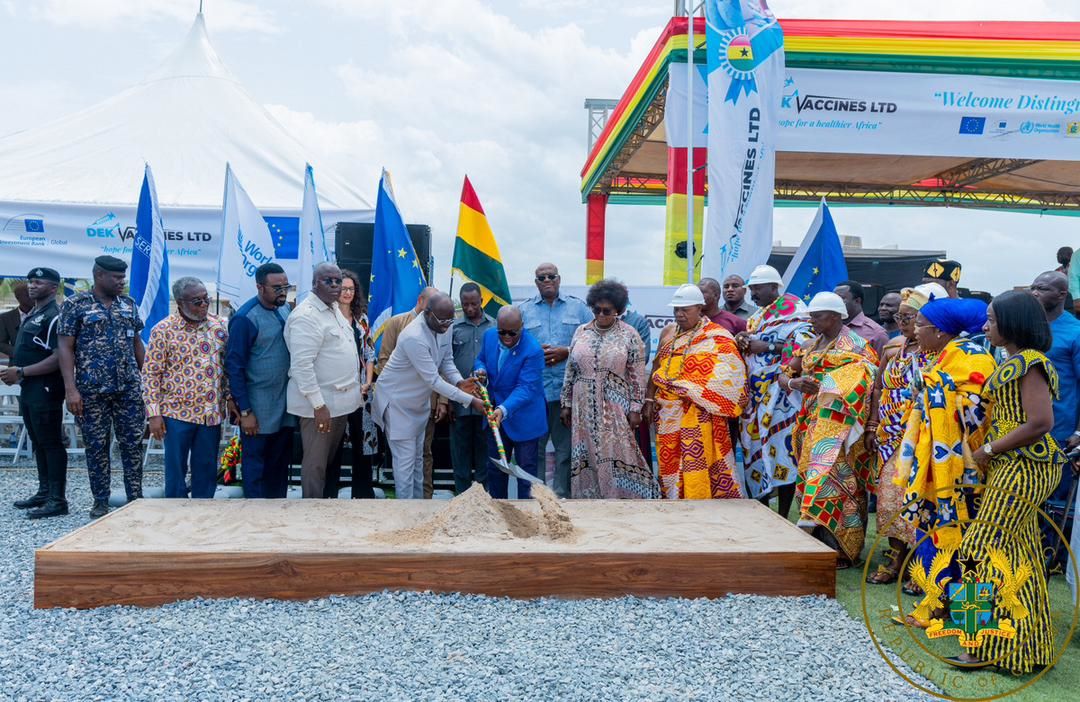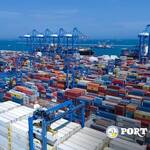President Nana Addo Dankwa Akufo-Addo, has cut the sod for the commencement of work on the construction of DEK Vaccines Ltd, a private sector-led consortium of Ghanaian pharmaceutical companies.
Members of the consortium
The companies are Danadams, Ernest Chemists, and Kinapharma Limited.
Second facility in West Africa
When completed, the facility will be the second of its kind in the West African sub-region.
600m vaccine doses a year capacity
The 600 million doses a year capacity vaccine manufacturing facility situated at Medie in the Eastern Region will be double the capacity of the 300 million capacity facility built by the Institut Pasteur in Senegal.
Over $122m to be invested to produce 13 different vaccines
DEK is set to invest over $122 million into a state-of-the-art company that will produce 13 different vaccines for Ghana as well as for export.
€5m EU grant
The European Union (EU) through European Investment Bank has signed a €5 million grant agreement which will among others serve as a seed-fund for the development of the vaccine manufacturing unit at DEK to kick start the project.
It will cover project-related expenditures, initial engineering, and civil works, equipment down-payments and additional feasibility studies, project development, and technical assistance.
Fill-and-finish deal with BioNtech
DEK will receive supplies from BioNtech, which will be converted into the final product, to be resupplied to BioNtech, based on a fill-and-finish agreement.
Malaria, HPV, polio among other vaccines to be produced
The factory will also produce other vaccines for conditions such as malaria, HPV, polio, among others.
UNICEF, Gavi supply vaccines to Most African countries
Most African countries are supplied with vaccines by UNICEF, supported by Gavi, the Vaccine Alliance.
Africa needs 1.5bn doses of vaccines each year
This has led to a very specific shaping of vaccine markets in Africa, where more than 1.5 billion doses are needed.
Fewer than 10 African manufacturers
There are fewer than 10 African manufacturers with vaccine production and are based in five countries: Egypt, Morocco, Senegal, South Africa and Tunisia.
80 sterile injectables facilities in Africa
There are about 80 sterile injectables facilities on the continent, which may provide an opportunity for vaccine production given the primary dosage form in Africa is vials.
Packaging and labelling
Most local companies only engaging in packaging and labelling, and occasionally fill and finish steps.
Speaking at the groundbreaking ceremony, President Nana Akufo-Addo said that the COVID-19 pandemic had taught “us to strengthen our unity and solidarity with our fellow African countries and provided us with the motivation to be self-reliant.”
COVAX and AU COVID-19 Initiatives
“While appreciating the COVAX and AU COVID-19 Initiatives, we are venturing into vaccine development and manufacturing with Rwanda and Senegal, and are determined to become vaccine manufacturing hubs in Sub-Saharan Africa,” he said.
Ghana imports 99% of all its vaccines
Currently, Ghana imports 99% of all its vaccines, including those for children under five.
Target of self-sufficiency in vaccine manufacturing
He explained that the aim of the government is to ensure that Ghana, achieves self-sufficiency in vaccine manufacturing to meet future national, regional and continental needs, to prevent the situation where the African continent is at the mercy of foreign vaccine manufacturers and geopolitics as happened in 2020.
He pointed out that the vision manufacture vaccines in Ghana begun on February 28, 2021, in update twenty-four (24) of what has come to be known as the “Fellow Ghanaian” series of addresses to the nation.
A 10-year roadmap
A 10-year roadmap has been developed for the vaccine manufacturing which spanned three phases: short-term, medium term and long term.
President Nana Akufo-Addo stated further that “One of the vaccines to be produced in this facility is the malaria vaccine, and as you may know, Ghana became the first country on 21st March 2023, to give access to the newly developed malaria vaccine by Oxford University and produced by the Serum Institute of India to be used in Ghana.
“I will therefore urge all well-meaning Ghanaians, entrepreneurs, and corporate bodies to help this initiative with whatever they can to make Ghana a producer of malaria vaccine among others,” he said.
Vaccine nationalism
“The vaccine nationalism that was played out by the developed world, with the rollout of COVID-19 vaccines, meant that we had to take urgent, critical steps towards making sure that never again would we be victims or pawns of the international vaccine order. It was imperative that we took our destiny into our own hands,” he said.
National Vaccine Institute
To this end, President Nana Akufo-Addo indicated that he established a committee, under the chairmanship of the former Minister for Environment, Science, Technology and Innovation, Professor Kwabena Frimpong-Boateng, to formulate a concrete plan of action towards domestic vaccine development and manufacturing.
This plan of action, he explained, culminated in the announcement of the establishment, in July 2021, of the National Vaccine Institute, with seed funding of $25 million from the European Investment Bank.
“Indeed, some two months ago, on February 14, 2023, the National Vaccine Institute Bill 2022 was enacted by Parliament, for which I have given assent, and whose Board of Directors will soon be outdoored,” the President said.
He added that “Its establishment has enabled the National Vaccine Institute work in unison with Ministries, Departments and Agencies in Ghana, to boost our country’s capacity to be self-reliant in the production of vaccines, and bring all of us to this gathering where work on the construction of DEKs Vaccines Ltd will soon begin.”
“The National Vaccine Institute will co-ordinate and facilitate the capacity of DEKS Vaccines Ltd and other domestic pharmaceutical companies, such as Atlantic LifeSciences, a company operating under Government’s 1-District-1-Factory Programme, which I commissioned in April 2022, to fill, finish and package mRNA COVID-19 and other vaccines such as those against malaria and tuberculosis,” the President said.
He stated that, in the short term of two years, DEKs Vaccines Ltd will fill, finish, and package COVID-19 and the other vaccines for those against malaria and tuberculosis.
Preparing for the next pandemic
The Managing Director of DEK Vaccines Limited, Pharm Dr Kofi Nsiah-Poku, reiterated the need for African countries, particularly Ghana, to be prepared for the next pandemic.
In view of this, he said that partnership between government, the private sector and other partners toward boosting the manufacturing capacity of local producers to venture into the technology and capital intensive initiative is key.
The EU Ambassador to Ghana, Irchad Razaaly, stated on his part that the EU has provided a €5 million grant to fund the project as a sign of its commitment to supporting Ghana to become the vaccine manufacturing hub of the continent.
The British High Commissioner to Ghana, Harriet Thompson, lauded the idea of having a local vaccine plant, saying that “the impact of a vaccine plant will stretch far beyond Ghana’s borders, not only through pharmaceutical exports, but in showing the world how concrete investments and global partnerships can work in Africa.”
- Friday, April 4, 2025 Newspaper Headlines - 4 April 2025
- Blewett: MTN CEO, a pilot, author, chartered accountant, marathon runner and many more - 3 April 2025
- MTN Ghana launches Y’ello Ladies Network - 3 April 2025

